Kindness is like the secret sauce of life, especially for kids. It shapes them, you know? How they interact with others, their self-esteem, all of that good stuff. So, here’s the deal: teaching kindness, deftly through quotes, right from the get-go, is crucial. We can’t emphasize that enough.
Now, I’m pretty stoked to share some real gems with you – these kindness quotes that are like pure magic for kids. I’ve seen these babies work wonders over the years. They’re not just words; they’re little sparks that can ignite a fire of kindness in any kid. Whether they’re making pals or just showing some understanding, these quotes nail the essence of kindness.
Our mission? Giving all you awesome parents, teachers, and caregivers a cool tool to nurture kindness in those little hearts. With these quotes, we can paint the world with compassion and understanding, one small act at a time.
So, buckle up, we’re in for a ride! Let’s dive into these ten amazing quotes. Trust me; they aren’t just words; they’re life lessons packed with my experiences and stories. Together, we’re guiding the next generation of kind souls.
The transformative power of kindness
In a world that can feel overwhelming, especially when it comes to children’s lives, kindness acts as a beacon of optimism and hope. Since I have been a teacher for over a decade, I have personally witnessed the incredible impact that kindness can have on children’s hearts and minds.
Fostering positive relationships and connections
Kids can develop strong bonds with their friends, family, and neighbors when they’re kind to others. Kindness is the cornerstone of satisfying relationships. By fostering an environment where children feel valued, welcomed, and supported, we help create a positive social environment. I can recall a heartwarming story about how Sarah, a student in my class, went above and beyond to greet a new student on their first day. In addition to making the new student feel welcome, Sarah’s kindness made the entire class feel like they belonged.
Promoting empathy and compassion
Empathy, or the capacity to comprehend and share another’s feelings, is fostered by kindness. Children learn compassion and regard for others’ well-being when they do random acts of kindness. I still clearly recall a lesson in which I assigned my pupils to compose letters of gratitude to those who had had a positive influence on their lives. The students’ sincere letters to one another not only increased their empathy, but also fostered a culture of compassion in our school.
Creating a caring and supportive community
Kindness extends beyond individual acts; it has the power to transform an entire community. Children learn that they can affect other people’s lives when they routinely see acts of compassion. By fostering a caring and supportive community, we empower children to become agents of positive change. In my years of teaching, I have organized community service projects where my students actively participated in activities like volunteering at local shelters or fundraising for a charitable cause. These experiences not only instilled a sense of empathy but also highlighted the collective impact of kindness.
The emotional wellbeing and character development
Nurturing emotional wellbeing
When it comes to fostering a child’s emotional development, kindness is essential. When children experience and practice kindness, they develop a sense of happiness, gratitude, and fulfillment. Kindness acts as a buffer against negativity and helps create a positive emotional climate. Through daily affirmations and acts of kindness, we can help children build resilience and develop a positive mindset.
Shaping overall character development
Kindness is not just a behavior; it is a character trait that shapes a child’s overall development. Children who are taught to be nice gain traits like empathy, compassion, generosity, and honesty. These qualities lay the foundation for strong moral character, preparing children to navigate the complexities of life with grace and empathy.
As we consider the ability of kindness to change, it becomes clear that it is not only an ethereal idea but rather a core principle that has the power to influence children’s lives. By fostering positive relationships, promoting empathy, creating a caring community, and nurturing emotional well-being, kindness sets the stage for holistic character development.
Here’re the 10 inspiring mantras to shape young hearts
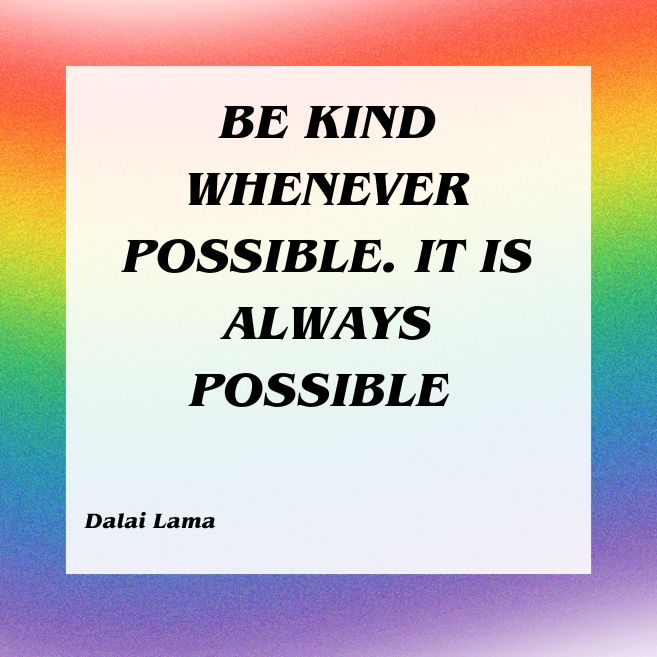
Explanation of the quote
Let’s explore the profound meaning behind the first kindness quote, shared by the revered Dalai Lama. This quote encapsulates the essence of kindness, reminding us that acts of kindness are not limited by circumstances or boundaries. As an experienced educator, I have seen firsthand how this simple yet powerful message can inspire children to make a difference in the world around them.
Quote in action
Imagine a scenario where a student, Alex, notices a classmate struggling with a challenging task. Instead of ignoring the situation, Alex approaches their classmate with empathy and offers a helping hand. This small act of kindness not only eases the classmate’s burden but also creates a positive ripple effect within the classroom. Other students witness this act and are inspired to follow suit, fostering a culture of kindness and support.
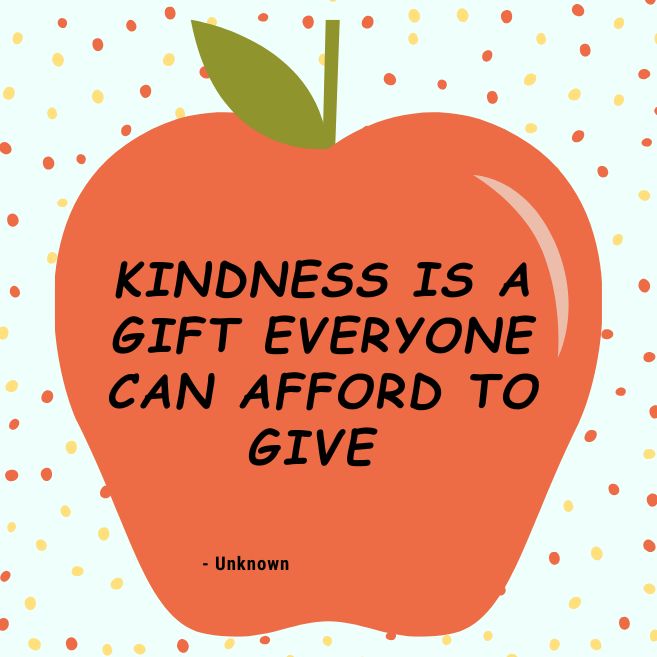
Quote in action
Imagine a school cafeteria where a student, Emily, notices a classmate sitting alone and feeling left out. Instead of passing by, Emily approaches the classmate, inviting them to join her group of friends. This small act of kindness not only brightens the classmate’s day but also fosters a sense of inclusivity and belonging within the school community.
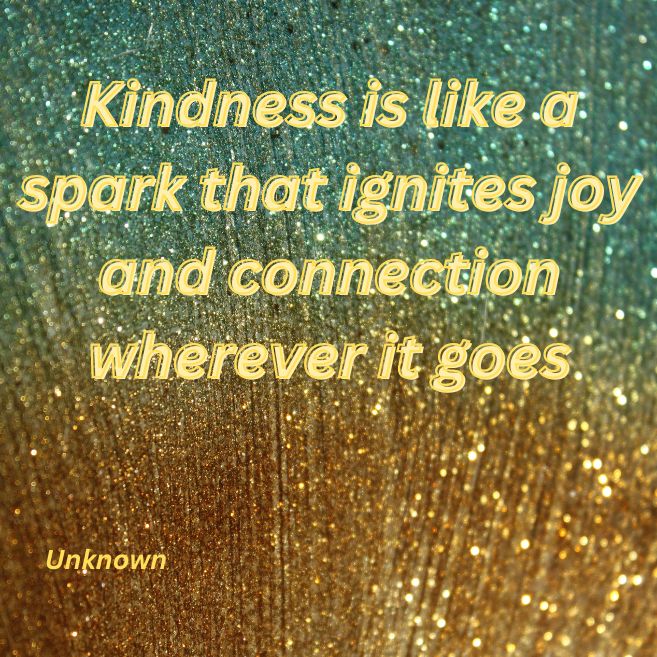
Quote in action
Imagine a school playground where a student, Jake, notices a new classmate feeling lonely and out of place. Instead of turning a blind eye, Jake approaches the new student with a friendly smile, introducing himself, and inviting the classmate to join in a game. This simple act of kindness not only brightens the new student’s day but also cultivates a sense of belonging and friendship within the school community.
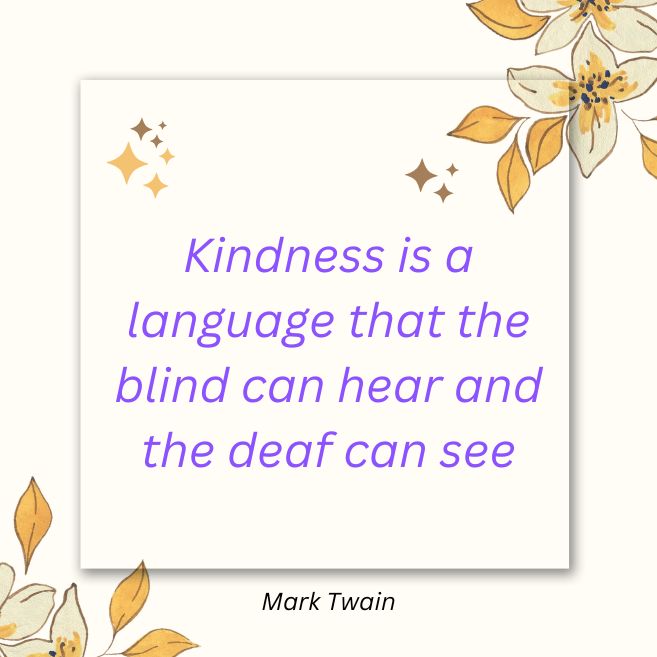
Quote in action
Imagine a classroom where a student, Maya, notices her classmate struggling with a difficult assignment. Instead of ignoring the struggle, Maya approaches her classmate, offering her assistance and patiently explaining the concept. Through her compassionate act, Maya not only helps her classmate understand the material but also fosters a culture of support and empathy within the classroom.
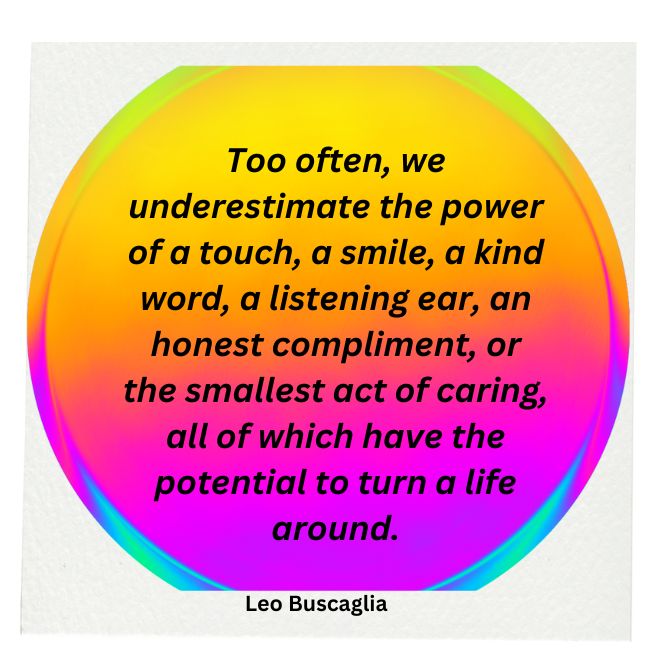
Quote in action
Imagine a school hallway where a student, Alex, notices a classmate dropping their books, scattering papers everywhere. Without hesitation, Alex rushes to help, picking up the papers and assisting the classmate in gathering their belongings. This small act of kindness not only alleviates the classmate’s stress but also sets an example for others, inspiring them to lend a helping hand.
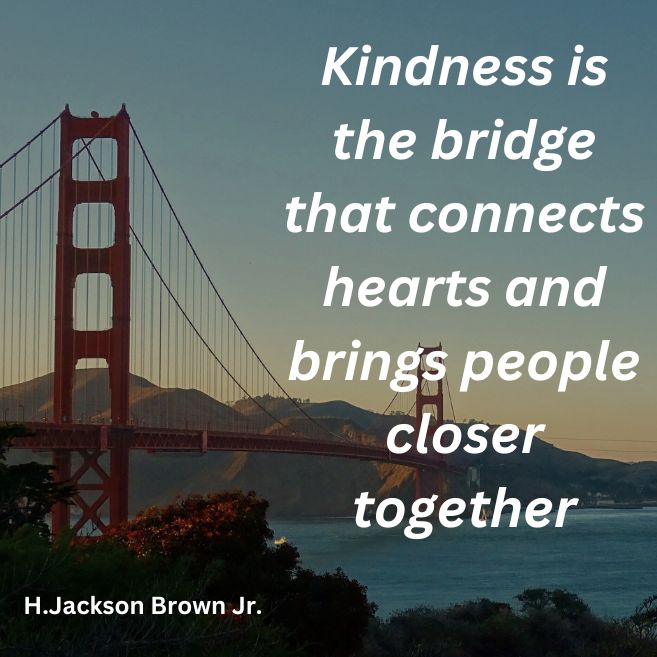
Quote in action
Consider a classroom with pupils representing several cultural groups. One day they have to work in pairs on a project for class. Sarah, a student from a different cultural background, is paired with Emily, a student from that same culture. Sarah shares her traditions and practices with Emily, and Emily welcomes the chance to learn more about them. They forge a strong connection and understanding via their kindness and willingness to work past their differences.
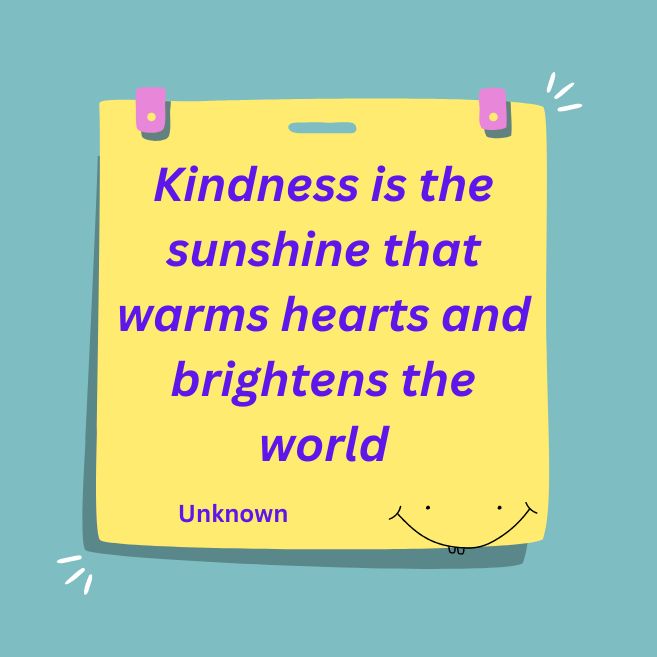
Quote in action
Imagine a classroom where a new student, Lily, feels nervous and out of place. During recess, a group of classmates approaches Lily with open arms, inviting her to join their game. The genuine kindness extended by her peers brings a radiant smile to Lily’s face and instantly makes her feel welcomed and included. This simple act of reaching out and embracing someone new demonstrates the sunshine-like effect of kindness.
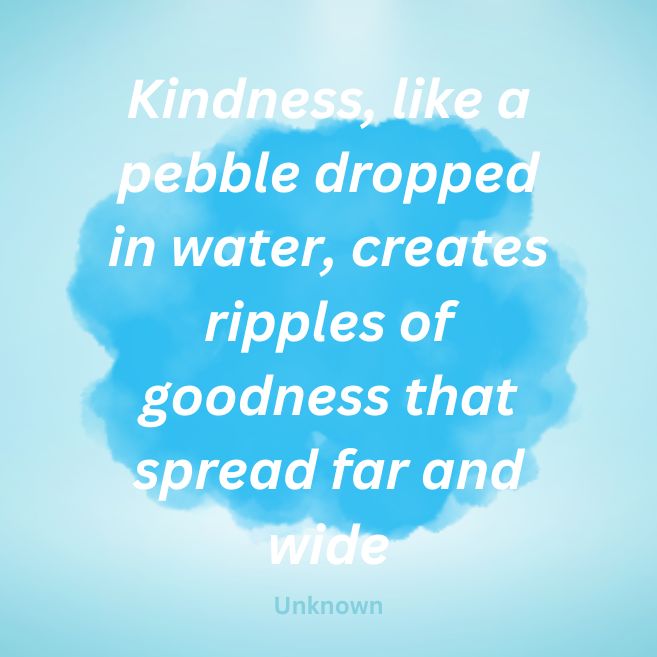
Quote in action
Picture a school cafeteria where a student, Ethan, notices a classmate sitting alone and feeling lonely. Instead of ignoring the situation, Ethan walks over, engages in a friendly conversation, and invites the classmate to join his group of friends. This small act of inclusion not only brightens the classmate’s day but also inspires others to be more inclusive and aware of those around them.
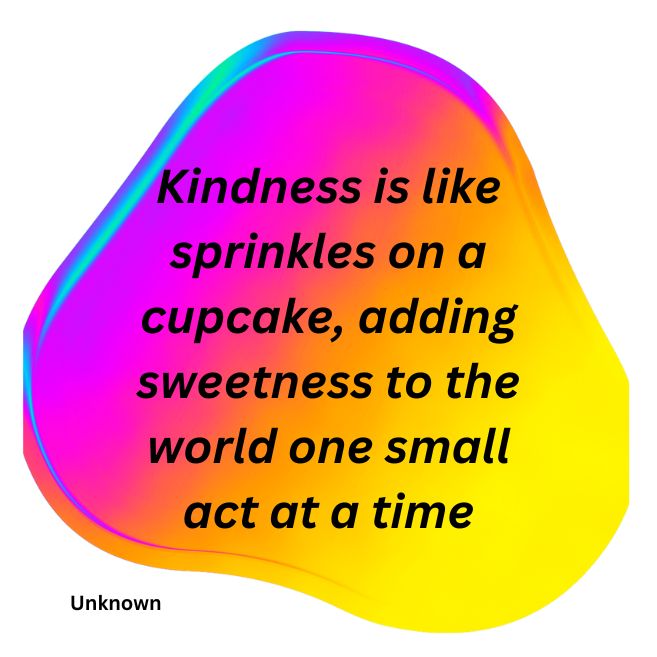
Quote in action
Imagine a classroom where a student, Sarah, notices that her classmate, Jack, is feeling down. Sensing his need for support, she offers him a kind word and helps him with his classwork. Sarah’s small acts of kindness act as sprinkles of positivity, brightening Jack’s day and reminding him that he is not alone.
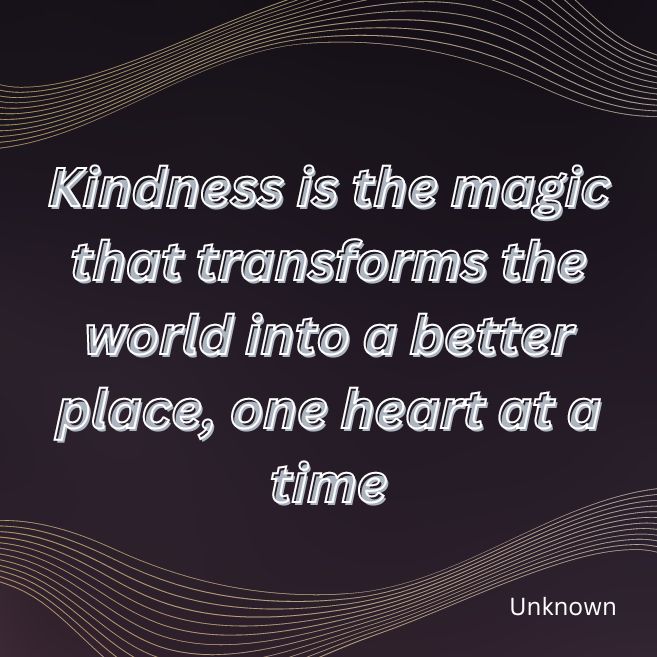
Quote in action
Imagine a school where a student, Emily, notices a friend who is struggling with a difficult task. Without hesitation, Emily offers her assistance, patiently guiding her friend through the process. Through her act of kindness, Emily not only helps her friend but also instills a sense of confidence and gratitude within her.
Nurturing kindness: Practical strategies for parents and educators
Leading by example
As educators and parents, it is crucial that we embody the values of kindness in our own actions and interactions. Children observe and learn from our behavior, so modeling kindness is essential. Demonstrating empathy, compassion, and respect in our daily lives sets a powerful example for children to follow.
Engaging in meaningful discussions
Create a safe space for children to explore the concept of kindness through meaningful discussions. Encourage open dialogue by asking thought-provoking questions such as, “How do you think kindness can impact others?” or “Can you share an experience where someone’s kindness made a difference?” These discussions deepen their understanding of kindness and encourage them to reflect on its significance.
Incorporating kindness into daily routines
Make kindness a habitual aspect of children’s life by incorporating it into their everyday activities. Encourage kids to carry out small deeds of kindness, such as opening doors for people, speaking kindly to a classmate, or doing chores around the house. Children who practice kindness develop the habit of empathy and consideration for others.
Involving children in acts of kindness
Engage young people in activities that let them take part in charitable deeds. Family service projects or community service projects in the school can help kids give back to their neighborhood. Children who participate in charitable activities gain the delight and contentment that come from improving the lives of others.
Embracing kindness: A path to a better tomorrow
In conclusion, teaching kindness to children is not just a noble endeavor but an essential one for their holistic development. Throughout this blog post, we have explored the significance of kindness and its profound impact on children’s lives. By incorporating the ten kindness quotes as mantras and daily affirmations, we empower children to embrace kindness as a guiding principle.
A lasting impression
Kindness has the power to create positive change, foster empathy, and build strong relationships. As parents and educators, let us make kindness a central aspect of children’s lives, nurturing a compassionate generation that will contribute to a more harmonious and caring society.
Share your kindness journey
Please post your favorite kindness quotes and stories in the comments section, let’s encourage and aid one another in creating a culture of kindness together. Keep in mind that even the simplest deeds of kindness can have a significant impact on the world.














